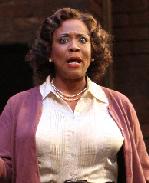SITE GUIDE
SEARCH
REVIEWS
REVIEW ARCHIVES
ADVERTISING AT CURTAINUP
FEATURES
NEWS
Etcetera and
Short Term Listings
LISTINGS
Broadway
Off-Broadway
NYC Restaurants
BOOKS and CDs
OTHER PLACES
Berkshires
London
California
New Jersey
DC
Philadelphia
Elsewhere
QUOTES
TKTS
PLAYWRIGHTS' ALBUMS
LETTERS TO EDITOR
FILM
LINKS
MISCELLANEOUS
Free Updates
Masthead
Writing for Us
A CurtainUp Review
Trouble in Mind
by Summer Banks
|
Trouble in mind, I'm blue
But I wont be blue always, cause the sun's gonna shine In my backdoor some day— the chorus of the 1927 blues standard. |

E. Faye Butler as Wiletta Mayer. (Photo by Joan Marcus)
|
The curtain never opens or closes on the stage, covered in Michael Locher's set that eerily and fittingly resembles the bare Yale Repertory Theatre stage. Thankfully, this backstage drama has much more substance than any typical actor-dramatic farce. Singer Wiletta Mayer (E. Faye Butler) has finally secured a starring role in a Broadway play. The only catch is that the play, Chaos in Belleville, is absolutely awful. And not only awful, but also disturbingly racist.
just a couple of changes (in CAPS): The racial atmosphere in Trouble's New York is tense and turbulent, and accurately reflected in the cast dynamics. Each character reflects a certain social position and moral view — Uncle Tom, practical/materialistic, passively compassionate— but none of these choices seem forced. A person simply had no choice but to fall into some category or another during this time.
The pressure of McCarthyism, the shadow of which hangs heavy over this play, echoes the compromises made over racial issues. Both sets of backstage connections influence the action within rehearsals, which are strongly influenced by director Al Manners' (Kevin O'Rourke) Stanislavskian tendencies. Every action and every line must be justified, he insists. He uses "unconventional" techniques to extract the honest results he wants from his cast, but these only lead him down a dangerous road with Wiletta.
Soon the very fact of honesty in theater seems much less simple than it first appeared. How can an action be justified truthfully, as Al directs, if there is no truth in it? Dovetailing with this question of theatrical truth, Childress, through Al, asks what the theater should do in morally charged social moments. Should a less than truthful message be promulgated if it will help promote peace and ultimately, perhaps, a more satisfying end?
As theses momentous issues underscore the action, Irene Lewis's tight and well paced direction keeps the production running at a smooth clip. She has an excellent eye for naturalistic and yet aesthetically pleasing moments on stage, arranging the actors around the set as one might arrange a still life. Her direction also appears to have worked in service of the cast's performances. They work as a tight ensemble with a strong sense of individual character.
Butler is extraordinarily compelling as Wiletta. Once she begins singing it's difficult to focus on anything else. She also brings more truth to her final, epic monologue than anything Al's contrived exercises could force.
Thomas Jefferson Byrd gives an equally intricate performance as the "yes-man" Sheldon Forrester and is particularly brilliant in one vividly accurate monologue describing a lynching he'd seen during his childhood. Laurence O'Dwyer as Henry, Starla Benford as Millie Davis and Don Guillory as John Nevins contribute considered and compelling performances.
Ably coordinating technical and artistic elements, this production is that rare example of a socially relevant play that's also satisfying on an aesthetic level. Perhaps it's disappointing that this landmark 1955 work is still so relevant in today's America. Racial prejudice is not nearly as overt but we're still grappling with many of the same issues. But it's also reassuring that the theater is still a place where truth has a right to be heard.
Editor's Note: This play also made a strong impression when it played in DC with the same lead actors. The DC review.
Trouble in Mind By Alice Childress Directed by Irene Lewis Cast: Starla Benford (Millie Davis), E. Faye Butler (Wiletta Mayer), Thomas Jefferson Byrd (Sheldon Forrester), Don Guillory (John Nevins), Slate Holmgren (Stagehand), Daren Kelly (Bill O'Wray), Aaron M. Larkin (Stagehand), Garrett Neergaard (Eddie Fenton), Laurence O'Dwyer (Henry), Kevin O'Rourke (Al Manners), Natalia Payne (Judy) Scenic Design: Michael Locher Costume Design: Paul Carey Lighting Design: Melissa Mizell Sound Design: David Budries Running Time: 2 1/2 hours includes one 15 minute intermission Yale Repertory Theatre 1120 Chapel Street (at York Street) New Haven, CT 203.432.1234 www.yalerep.org From 10/26/07 to 11/17/07; opening 11/01/07 Tickets: Weekdays: Full $48.00; Senior $38.00; Student $20 Weekends: Full: $58.00; Senior $48.00; Student $25 Contact box office for information on Rush Tickets Reviewed by Summer Banks based on 11/03/07 |
Try onlineseats.com for great seats to
Wicked
Jersey Boys
The Little Mermaid
Lion King
Shrek The Musical

The Playbill Broadway YearBook

Leonard Maltin's 2007 Movie Guide


Wicked
Jersey Boys
The Little Mermaid
Lion King
Shrek The Musical

The Playbill Broadway YearBook

Leonard Maltin's 2007 Movie Guide


